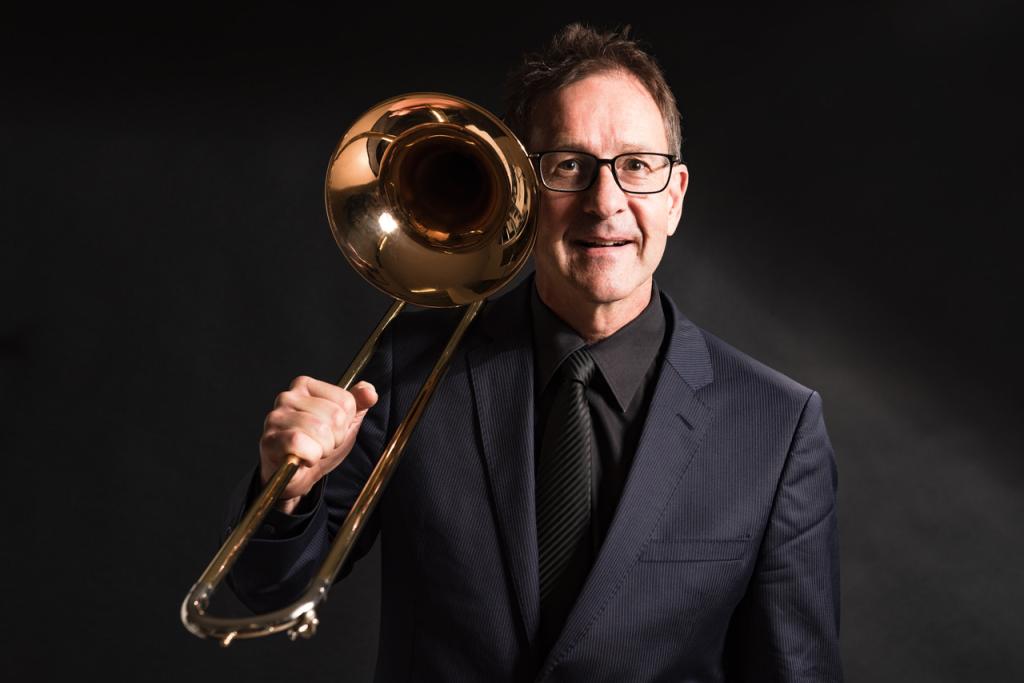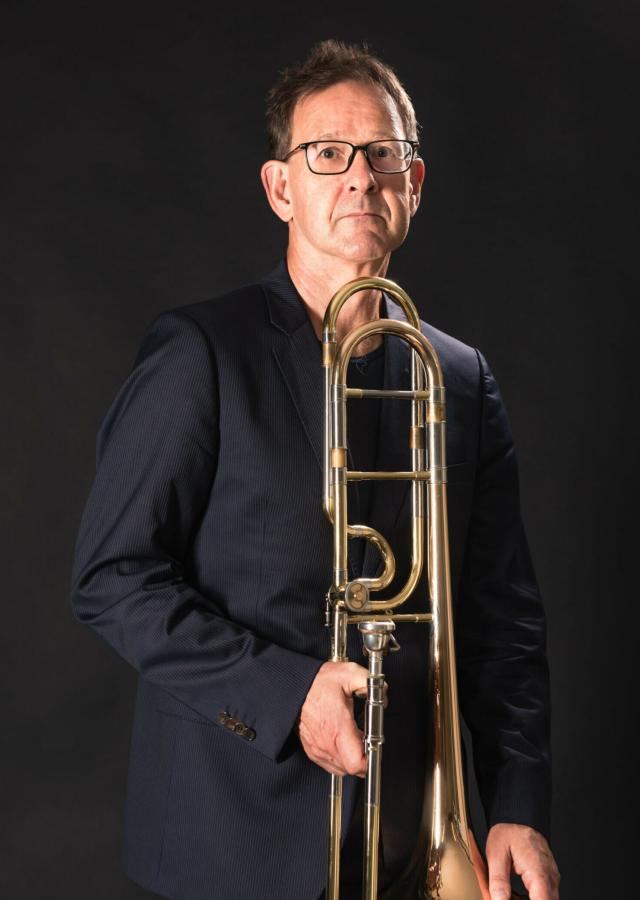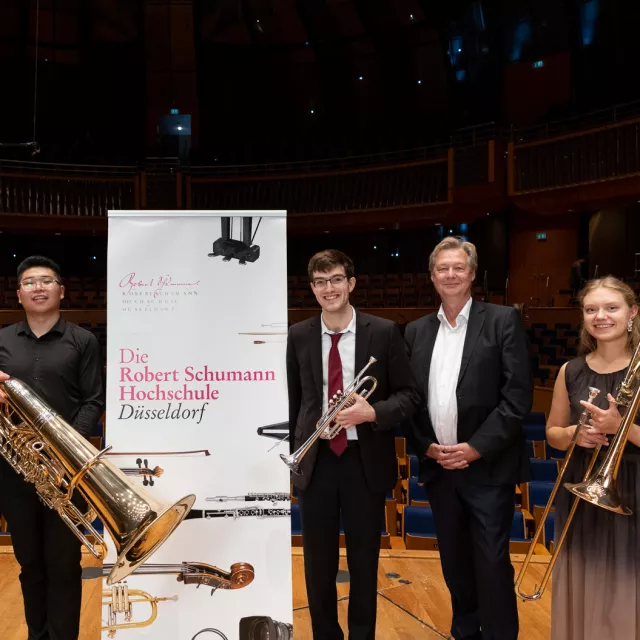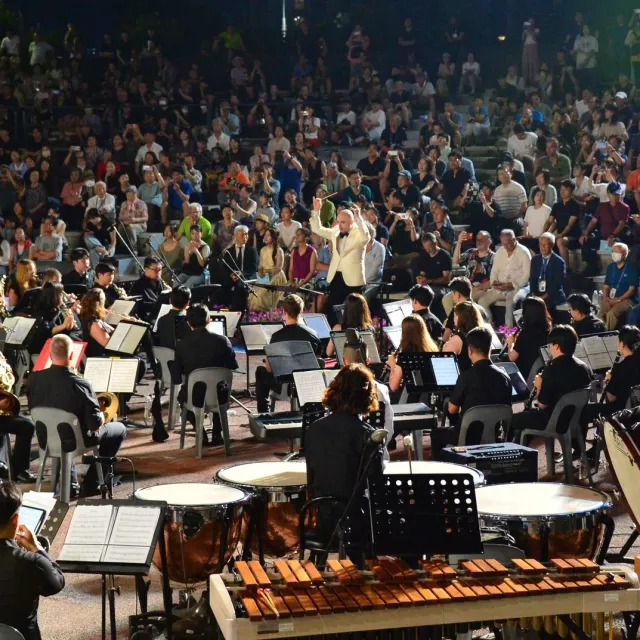Ian Bousfield has been at the top of the profession for over one quarter of a century, excelling in perhaps more facets of the music business than any other trombonist to date. Born in York in 1964, he won the Shell London Symphony Orchestra scholarship in 1979, at which point his career began to move undeniably in the direction of orchestras. He joined the European Youth Orchestra aged 16 under Claudio Abbado and made a brief stop at the Guildhall School of Music and Drama in London before becoming Principal Trombone in the Halle Orchestra in 1983. In 2000, following a successful audition in Vienna, Ian Bousfield became Principal Trombone of the Vienna Philharmonic/Vienna State Opera as the first, and to date, only British member in the orchestra’s history. Currently, he is Professor of Trombone at the Hochschule der Künste in Bern, Switzerland, a position he has held since September 2011.
In 2023, Bousfield was on the Jury of the 17th International Aeolus Competition for Wind instruments in Dusseldorf. In this interview, he speaks about his impressions at the Aeolus, his thoughts about competitions, and his own, remarkable career.
Ian Bousfield: I am actually quite sceptical about competitions. In a way I love them, but perhaps not the way many of them are now, not in this kind of format. And of course, I speak from the point of view of a trombone player- one that actually never did a competition himself. When I look around, none of the people at the top of the trombone world did competitions. Even trumpet players- Håkan Hardenberger never won a competition, and he is the only one, or one of the very few people who can really make a living as a soloist. None of us made our career by winning a competition, which of course is wholly different from being a pianist or singer.
WFIMC: Every competition has a different purpose, and not all are aiming to promote soloists. Take the Joseph Joachim in Hannover, for example, where there are a lot of different rounds (violin solo, with piano, solo with chamber orchestra, play-conducting a chamber orchestra, playing first violin in a string quartet, playing solo with orchestra) and it’s impossible to be perfect in all these different disciplines unless you are Anne Sophie Mutter. Plus, the jury is not voting and giving away all the prizes- there are votes by different groups of people- the jury, the junior jury, the string quartet, the audience etc. The jury really gives only the main prize.
I think that’s absolutely wonderful. But again- with an instrument like mine, maybe also with the accordion, or the percussion, or the harp- you are simply not just going to win a competition and you will be booked as a soloist. This is just not going to happen for us.
I am very fortunate in that my students are absolutely wonderful. They are really the top players around. Out of these, 90%-95% want to play in an orchestra, but I may get the odd one who dreams of being a soloist. So I say: well, let’s have a look at the ingredients that are required to become a soloist. Can you persuade people to write concertos for you? Can you persuade festivals to take you on? Evgeny Kissin may go and play whatever he wants with the top orchestras in the world for the next 50 years. But as a trombone player, how persistent are you? Who are you as an artist? What’s your artistic plan? How are you going to persuade a funding body to fund a tour to South America?
WFIMC You didn’t mention Christian Lindberg….
Yes, we have this one, the one and only trombone soloist. He is like a brother to me…. I really love him and we are very close. But you see, he is someone who doesn’t understand the word “No”. He will keep going until he gets that funding. He will keep going until he's learned how to have his own recording company. If he wants a composer to write for him, that composer has to be ready for five text messages and two phone calls a day until they say yes!
There are so many different “ingredients” to become a soloist, so I really like this kind of “split format” you mentioned. It offers a lot of different perspectives, and I think that’s wonderful. But I also like the Aeolus Competition in Dusseldorf, where you have a University director, a pianist, a conductor on the jury: they all are looking at it through completely different eyes too. It’s all very well planned and organized, transparent and inspiring at the same time.
But it’s not always like that. The more we swim in our own muddy puddle, the less we are likely to help the next generation of trombone players. Sitting on the jury of the Aeolus Competition, I have seen this quite clearly. Candidates were getting points from this jury which they would have never received if there were only trombone players on the panel. They did something which was simply not acceptable “trombone etiquette” wise. But who cares?
I really like this idea of different perspectives. For example, one of my students who won at the Aeolus Competition just finished her Bachelor’s at the University here in Bern. The head of the performance department was practically on his knees, begging her to stay and do a soloist diploma, saying: You are exactly the person we are looking for. And yet, the same person will drop out of the first round in orchestra auditions, because she is doing something different trombone-etiquette wise.
I think it would be really cool if the finalists in a competition, maybe the last three or four, would have to give an artistic five year plan to an agent, and the agent would give grades on these proposals. Winning a competition is one thing, but giving the winners future opportunities is something else: you need to consider if and how they are going to survive as a soloist in a very challenging musical landscape.
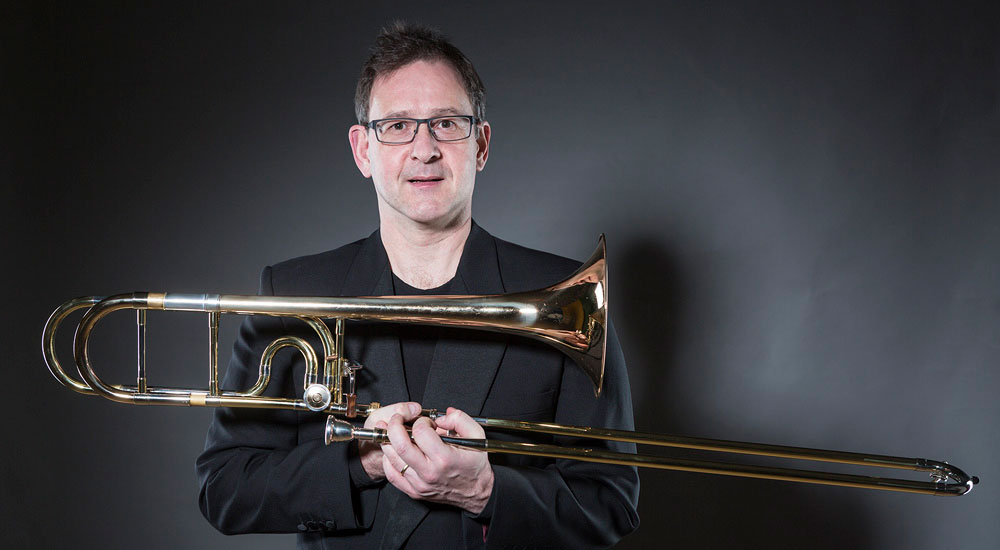
What was your experience auditioning for the Vienna Philharmonic? They are not just looking for any kind of player. They require a certain artistry. They want to hire a soloist, maybe not someone who is playing recitals every day, but someone with a certain artistic level. Therefore, wouldn’t it be helpful for you to do a competition before you go to audition? In a competition, you might really raise your artistic profile, you might even grow above yourself. You have to do a lot of repertoire. You have to master a lot of pressure, control your nerves. And it’s not just like an orchestra audition where you go, play two minutes, they say “Thank you!” And you go home…
Interesting point. But with that specific orchestra I don’t think a competition would help in any other regard other than you are experienced at playing and performing, and you’re ready to stand up. Of course they want a performer, but orchestras like that are looking for a certain shaped jigsaw puzzle piece. It means that they want authenticity in what you're doing. So are you playing Mozart the way they consider Mozart should be played? There are so many famous examples in an orchestra, where amazing players didn't make it through the first round because the orchestra didn't consider them to be stylistically appropriate.
Is it really that different?
I am not that experienced in competitions. But for me, if I was organising a soloist competition, yes, of course it's about music and of course it's about the composer, but it's also about the performer: a dynamic human on the stage that has the ability to fascinate the audience, to hold the attention of 5000 people for 20 minutes and doesn’t let it go. That's what we would be looking for. Whereas in orchestras, they are looking for someone who can do as they’re told. Who can turn up at a certain time and play Mozart in a certain way. For them, it’s nice that you might have ideas, but you should save those for your private time. Did you know that in Vienna, they are asking violinists in the first round of their audition to play the Blue Danube? I mean, it seems bizarre!
You are not judging in a lot of competitions…
I tend not to sit on juries. I am so happy that I went to the Aeolus, which was a remarkable experience and really worth it. But I tend not to do it because I just think that it doesn’t help to see a teacher handing over a prize to one of their students or to see them standing on the stage as one of their students receives a prize. I don't think that helps anybody. The person who won the last ARD competition on the trombone was a clear and obvious winner, not only during the competition, but also before it. However, he’s only had two teachers, and they were both on the jury. I find that unfortunate, because that young person really deserved to win. But people are always going to look at it and say, well, there are only seven on the jury. Now do the math...
So that's why I personally tend to avoid sitting on juries, because I'm 60. I turned 60 on Friday. And in five years time, in their ultimate wisdom, the Swiss government will say that I am no longer capable of teaching. So I will then be free and available to sit on as many competition juries as people would like to have me on.
For me, it doesn't look good if there are too many teachers of active competitors. Most competition organisers disagree with me because there are a lot of very active teachers involved, too. But, frankly, I am embarrassed if I am on a jury and one of my students is playing. Of course, I don't have anything to do with the voting, but still, I’d rather not be in that hall. The time before last, one of my students won the ARD, and I was on holiday in Italy, so that was really great!
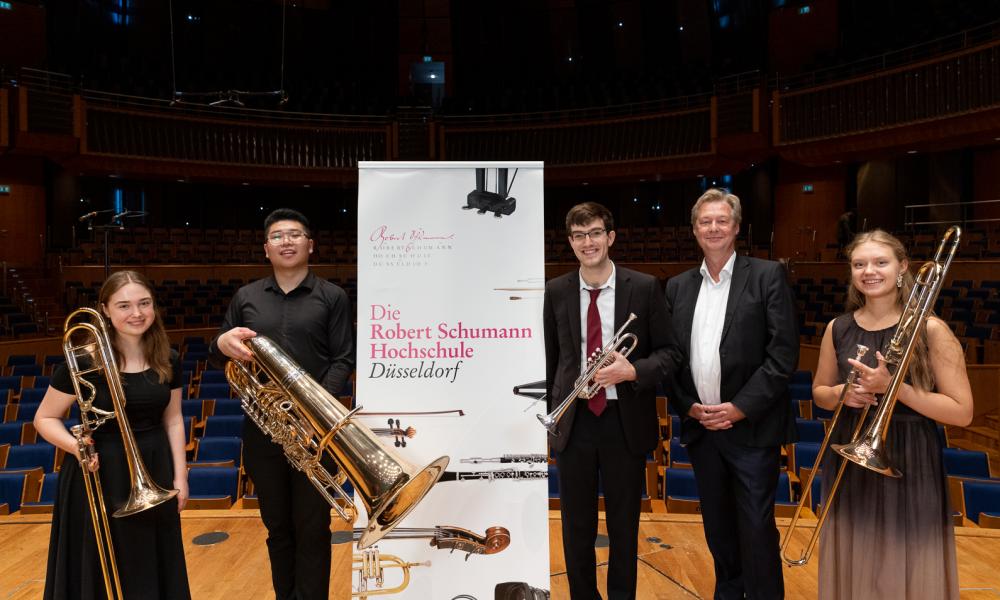
Winners of the 2023 Aeolus Competition
It’s a valid argument, but there are now a growing number of competitions which have much stricter rules. And there are some that don’t accept candidates if there is or has been any kind of teaching relationship at all. They will not be admitted to the competition.
I think that’s great.
Maybe this wouldn’t work with trombone, because there just aren’t enough soloists, but take for example the Cliburn Competition: they have only performers on their juries. Even in their junior competition, the jury consists exclusively of performers. They don’t need a rule about students because the jury doesn’t have students.
Right.
There is one more point I’d like to mention. For me, the way of judging in competitions is often too much about whether you like something, whether someone does what you do, or what you don’t do. So if someone from that school plays, they'll do something that we don't like. We don't play accents like this, we don’t phrase like that. Someone might get a low mark because they don’t play the way that the juror plays. But it should be: “this is a good sound. It’s not my sound, but that’s not my business. It’s a beautiful sound. It’s very expressive, it’s very close to the text of what I'm hearing, and you can hear a very clear interpretation, so that gets a high mark.
This is what has irritated me a bit about competitions in the past. I am probably not very good on a jury, but please have a look at the wall behind me (points to a framed certificate on the wall): I am a Chevalier de Tastevin, a chevalier for wine in France. It’s one of my big passions. When you take a wine, you identify what it is. The qualities of what it is not, or whether you like it, that is none of my business. Whether I like it or not, I am assessing its qualities in a rather distanced way. My personal taste is Burgundy, but that doesn’t matter. It’s like saying: well, yes, this was an excellent wine, but it was a Californian Cabernet Sauvignon, so I am not interested.
I have spent my whole life trying to appreciate other people’s take on music, and I think that’s a quality that’s still missing a bit in competitions.
“Judging” is such a horrible word. When I look back in my life over the most amazing, life changing moments with Abbado, with Solti, with Bernstein- they don’t happen over two hours and they don’t happen over twenty minutes. They happen in thirty seconds. Something will happen in a concert where you literally think, if you’re ever going to come back down, now would be a good time. But these moments that are just otherworldly, they are really the reason why we do this. Moments, snapshots- like a special moment in a relationship, or like the smell of a flower, the feel of a sunny day. That’s what we are all looking for in music. But how do you “judge" that?
A special moment happens and you only know. You cannot describe it, but you will know when it happens, and everybody knows it. If somebody stands there and lights up a room for me, that’s a competition winner. But these moments get often missed because juries tend to look at mistakes, at small issues here and there.
Still, many of your students are taking part in competitions.
I tell them not to until they win. I tell them not to go, but they say: hey, it’s a 20.000 Euro prize, and I need money. Are you going to give me the money or not?
Actually, I even did my own competition. Online, as it was during COVID. I thought of it as an attempt, and maybe not the master format, but maybe not so bad from a brass playing point of view. A lot of people took part, and the interesting thing is that the top ten of the competition are now all sitting in orchestras, and one of them is becoming a soloist… But I liked what you said in the beginning, about the Joachim Competition in Hannover. It sounds fascinating to have so many added ingredients, like asking candidates about their artistic ideas, or how they would program a festival.
